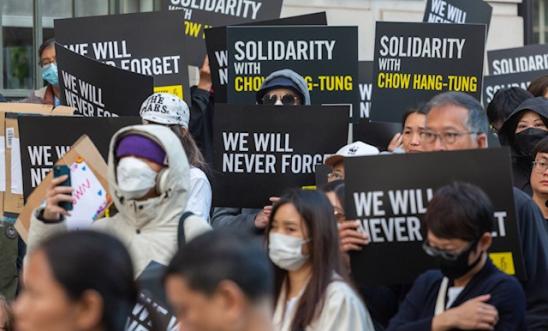
Press releases
UK: Hundreds of people join Tiananmen vigil outside Chinese Embassy

Protesters called for justice for Tiananmen victims
Hong Kong prisoner of conscience Chow Hang-Tung went on hunger strike
‘The large turnout shows people have not and will not forget the brutal crackdown against peaceful protestors in Tiananmen Square – Sacha Deshmukh
‘People from different generations stood here to say no to dictatorship. White paper or white hair, we all have to face June 4th.’ - Dr Shao Jiang
Chow Hang-Tung, who is in prison in Hong Kong, went on hunger strike for 34 hours to mark the 34th anniversary of the Tiananmen crackdown. She was prosecuted in 2021 for peacefully calling for the 4 June crackdown to be commemorated after the Hong Kong authorities cancelled a vigil.
The Chinese authorities continue to conceal information on the events of this period and ruthlessly crush any modern protests associated with it. Up until 2020, Hong Kong was the only part of China where the massacre could be commemorated. However, under the territory’s draconian National Security Law it is now prohibited to publicly commemorate what happened in Tiananmen in 1989.
Sacha Deshmukh, Amnesty International UK’s Chief Executive, said:
“The large turnout shows people have not and will not forget the brutal crackdown against peaceful protestors in Tiananmen Square 34 years ago.
“The Chinese authorities continue to crush dissent in mainland China and in Hong Kong, where marking this important anniversary is no longer permitted.
“Chinese state repression extends far beyond its borders including to communities living in this country. The UK government must defend Hong Kong and mainland Chinese people living in the UK from the Chinese government’s efforts to intimidate and silence them - their rights to peaceful protest and freedom of expression must be protected.”
Dr Shao Jiang, June Fourth Sparks’ co-founder, said:
“In 1989 people from all walks of life – students and workers, doctors and journalists, urban dwellers and peasants – all came together in front of the tanks.
“The victims include people from different ethnic groups, which remind us that Tibetans, Uyghurs and other ethnic minorities all fought together with Han Chinese for human dignity.
“Today people from different generations stood here to say no to dictatorship. White paper or white hair, we all have to face June 4th. Some brave Chinese feminists also joined us to say no to both authoritarian rule and patriarchy. Our focus may range from democracy and human rights to labour activism, feminism and national self-determination, but we stand together in solidarity.”
Speakers at the vigil included Dr Shao Jiang, June Fourth Sparks’ co-founder; Nabila Hanson, Amnesty International UK’s China Country Coordinator; Tenzin Kunga, president of the Tibetan Community in Britain; Au Loong-yu, writer and labour rights activist; Mung Sui-Tat, Executive Director of the Hong Kong Labour Rights Monitor, writer Ma Jian, and China Deviants.
Local Amnesty groups also held vigils in Edinburgh, Leeds, Manchester, Newcastle, Portsmouth and Sheffield.
Tiananmen crackdown
Hundreds – possibly thousands – of people were killed in and around Beijing’s Tiananmen Square on 4 June 1989 when Chinese troops opened fire on students and workers who had been peacefully calling for political and economic reforms as well as an end to corruption. Tens of thousands were arrested across China in the suppression that followed. Many were charged with counter-revolutionary crimes and served very long prison sentences following unfair trials.
Regularly since 1989, activists in mainland China have been detained and charged with “subversion” or “picking quarrels” if they commemorate those who were killed, call for the release of prisoners or criticise government actions during the Tiananmen crackdown.
Dr Shao Jiang was student protester
Dr Shao Jiang was heavily involved in Chinese student movements from 1985 to 1989 as a student at Beijing University. On 17 April 1989, he drafted a list of demands with his fellow students, with these later becoming one of the main manifestos of the 1989 pro-democracy movement. On the evening of 3 June, Shao witnessed the killings by security forces in West Chang’an Avenue before running back to Tiananmen Square to warn fellow protesters of what was coming. He was among the last group of protesters to leave the square early on the morning of 4 June. He was jailed for 18 months in a series of provincial and national prisons from 1989 to 1991, and again put in detention centres and under house arrest for his involvement in civil resistance between 1994 and 1997. He fled China in 1997 and has been in the UK since 2003. He is co-founder of June Fourth Sparks: https://64sparks.blogspot.com/